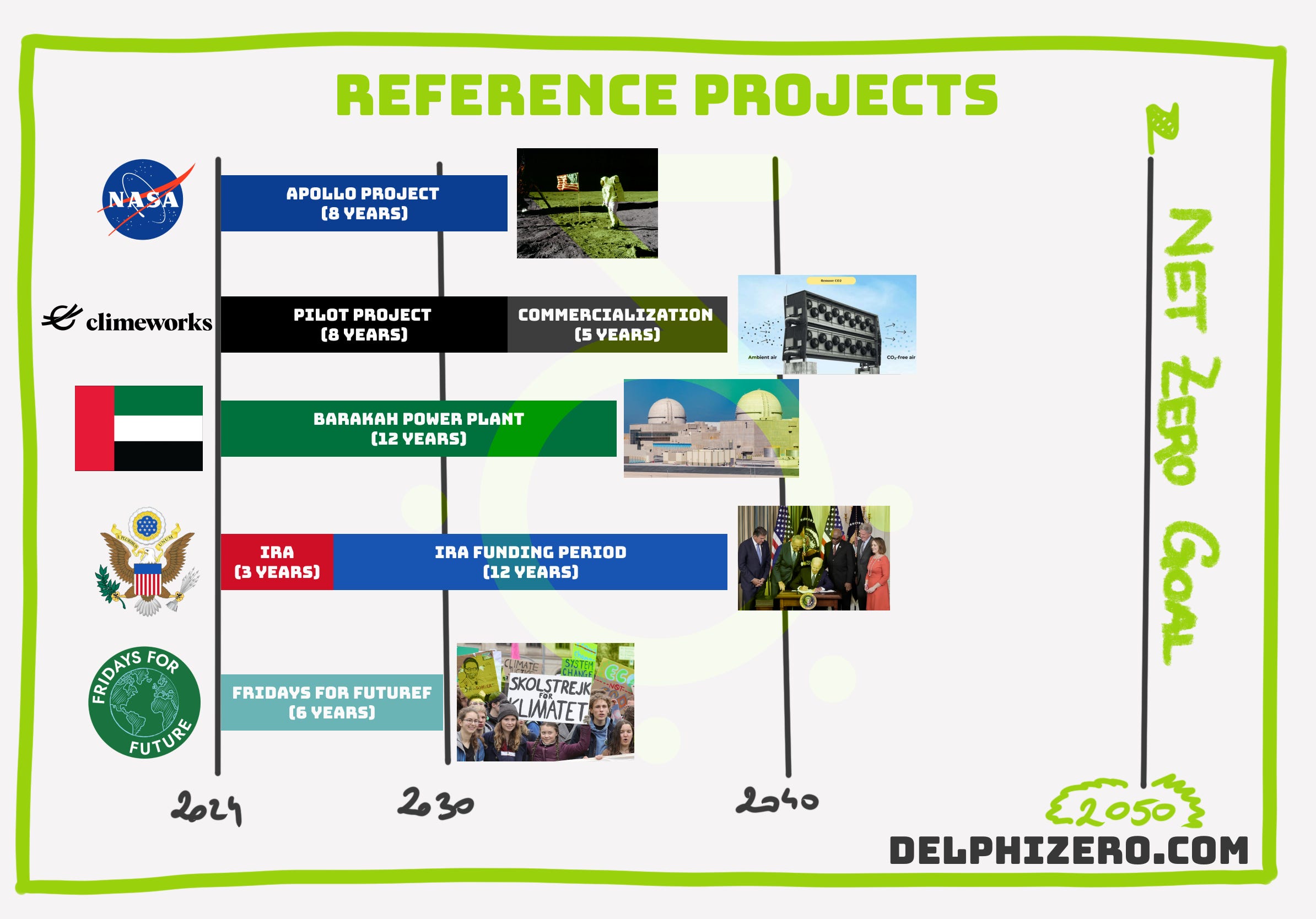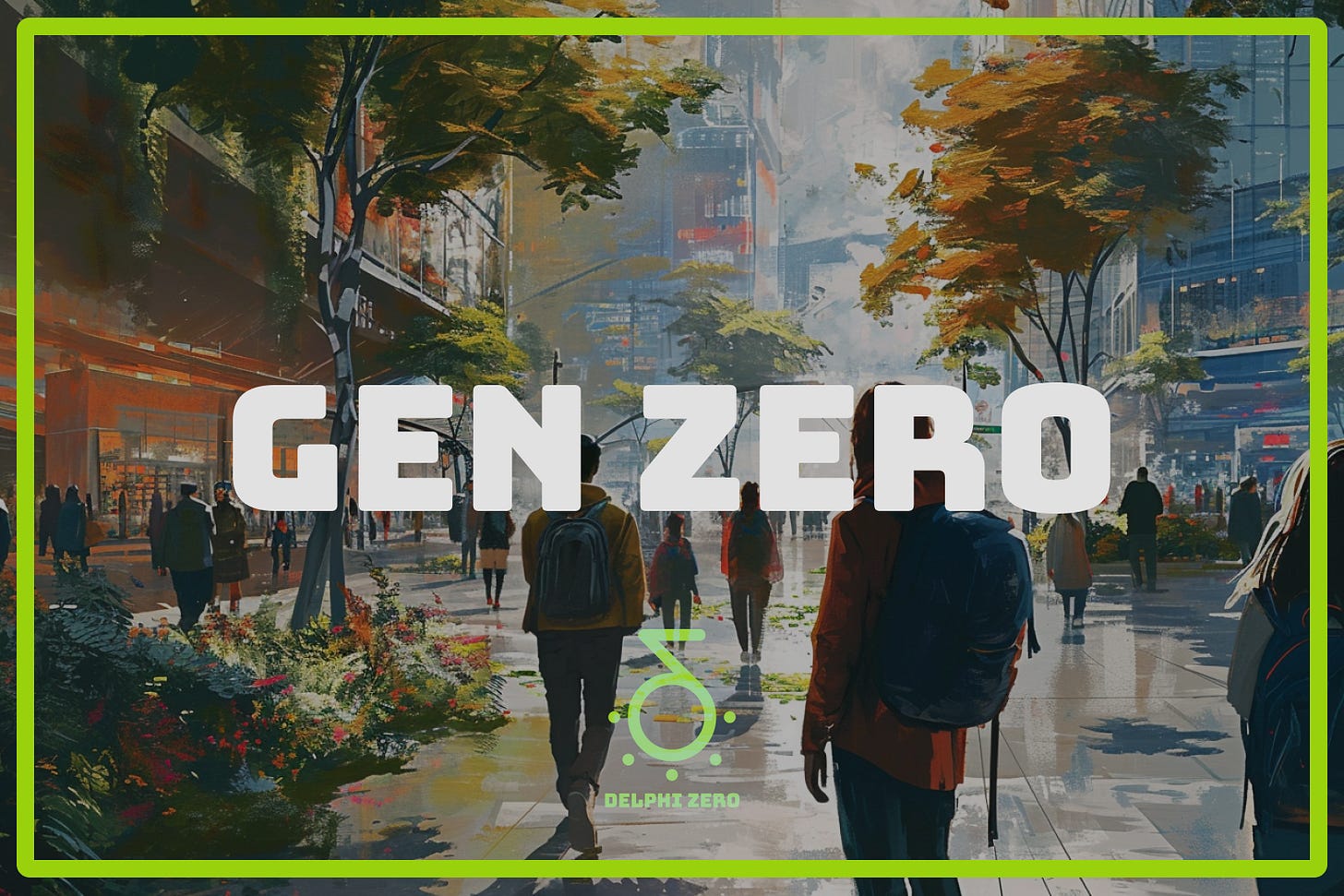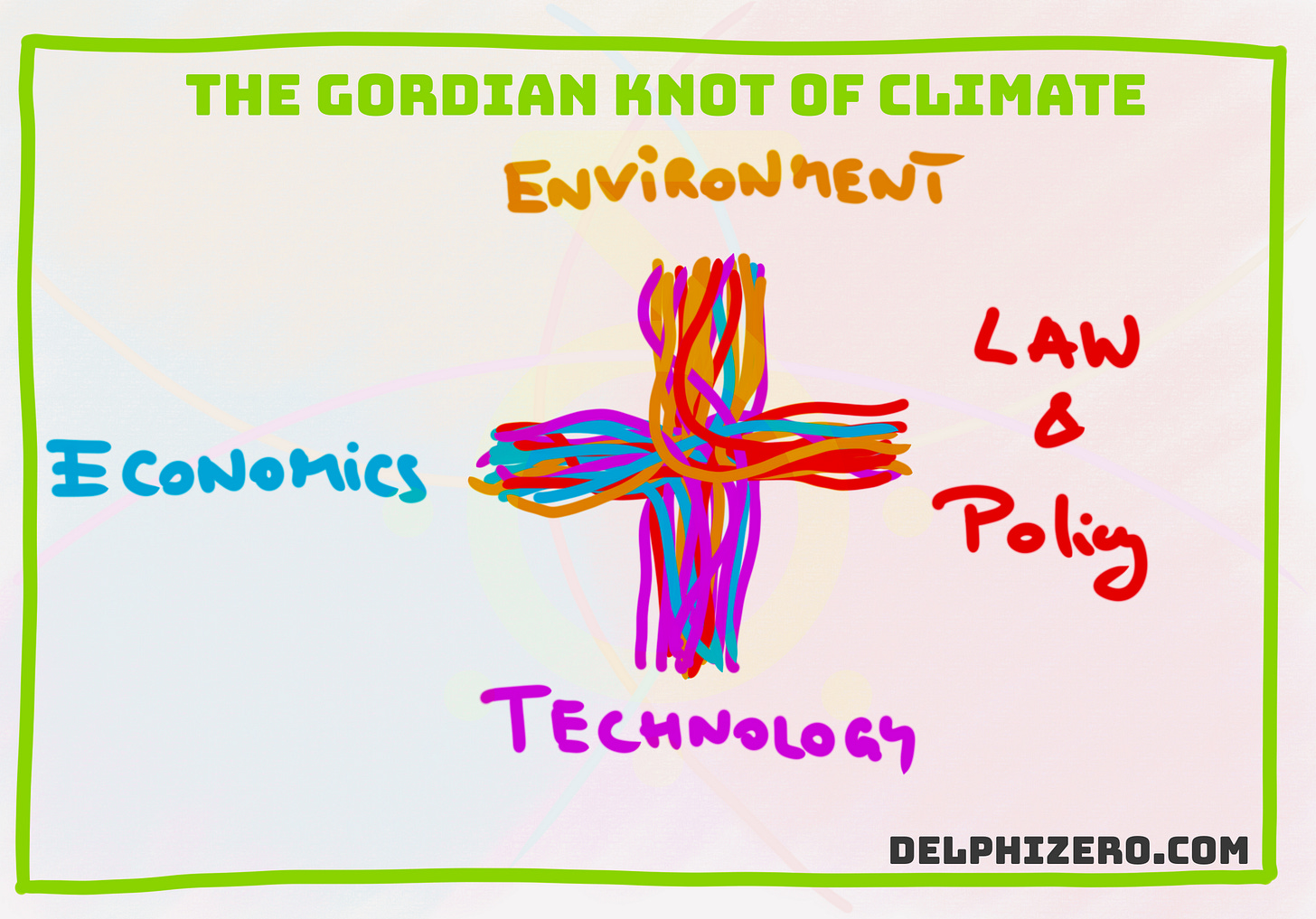Gen Zero
A Shower Thought that Woke Me Up from My Winter Slumber 👀
👋 Hey to 1,799 climate buddies 🌳
What is this? This newsletter explores topics in climate, energy, and everything in between.
Happy New Year everyone!
I’ll start my year with a short essay about the 26 years we have left until Net Zero.
Gen Zero
By Art Lapinsch
A while ago I had the following shower thought: Net Zero is only 26 years away.
Actually, it’s more like 25 years, 11 months, and a couple of days.
Suddenly, 2050 - the year by which most countries want to achieve climate neutrality - seems much closer than I thought.
😳
This leads to a practical question 👇
How Much Time Is That Actually?
From today until January 1st, 2050 we have:
~26 years, which is equal to
323 months, which is equal to
9,847 days
What have we done historically with our time?
Let’s put it into perspective and compare it against some “big endeavors.”

These five examples represent different areas:
🚀 Governmental Moonshot Project: Apollo Program → 8 years (1961 - 1969) from inauguration to putting a man on the moon 🌘 Construction Physics has a great write up about the technical complexities of this gargantuan task. It is a bit of an apples to oranges comparison since this was back in the 1960s where the economics and political circumstances were completely different to what we are facing today. But, it is still the evergreen example when we are talking about moonshots - in this case, literally.
🌬️ DeepTech Startup Project: Climeworks DAC (Direct Air Capture) → 8 years (2009 - 2017) from company founding to pilot project and then another 5 years (2017 - 2022) to proper commercialization of the technology. A modern-day example of timelines for private frontier tech companies.
☢️ Governmental Energy Infrastructure Project: Barakah Power Plant → The United Arab Emirates planned, built, and turned on the first nuclear power plant of the Middle East. It took them roughly 12 years (2009 - 2021) from awarding the project to electricity being generated in their first reactor. This is still remarkably fast given how development timelines for nuclear projects have ballooned over the past decades. Nonetheless, a good reference for a large infrastructure project with tons of political will behind it.
🦅 Governmental Policy Incentive Project: Inflation Reduction Act (IRA) → The US government passed its largest climate-related law in 2022. In it, the US earmarked $300B+ in governmental funds to kickstart critical industries at home, accelerate the transition to renewables, and give financial relief to households who are doing their part to mitigate emissions. The planning, negotiating, and drafting phase of the bill was roughly 2 years (2020 - 2022) and the some of the incentives can be tapped for up to 12 years (2022 - 2034) after its passing. A benchmark for a domestic landmark policy.
✊ Social Movement Project: Fridays for Future → Ok, this one was surprising. Given how prevalent it is in the media and long ago it seems that Greta Thunberg attended her first Davos Summit, I could have sworn that it was more than 6 years (2018 - 2024) of public demonstrations. It goes to show how quickly a movement can catch fire if it resonates with people. Think about it (and their people) what you want but FFF is a solid example for the potential timeline of a social movement.
Change takes time - usually on the order of a decade.
Realistically, we will need hundreds of such projects in parallel to reach Net Zero.
Complexities of Climate & The Social Element
In an earlier essay, I wrote about the Gordian Knot of Climate:
I would break it down even further and say that most climate topics must cover four fundamental areas to be useful:
🌳 Environment: What is the impact on our planet?
🤖 Technology: How can technology and innovation be leveraged?
💶 Economics: Is it economically feasible to deliver this innovation to the market?
⚖️ Law & Policy: Does it align with the legal and political context?
Now, looking at all of the above, I have two thoughts:
I believe more than ever that there is enough exciting stuff to do for everyone who wants to get involved. Are you an accountant? Great, go do some financial magic at one of the many project developers! Are you a lawyer? Great, help the bazillion climate tech companies figure out the regulatory jungle. Are you a storyteller? Great, go and convince mass audiences that it’s cool to make money while saving the planet. And so on, and so on…
More importantly, I totally missed the most important thread running through the Gordian Knot: People1 → We won’t solve the net zero challenge without inspiring and triggering people into action 🤷♂️
This leads me to a very important question 👇
Who Is Going to Be Productive Over the Next 26 Years?
Hint: It’s not the kids who are born today and it’s not going to be the professionals who are reaching their retirement age.
Let’s get an intuition for this statement 👀

My takeaways are:
💪 Productivity Windows: Generally speaking, people go through their life with a specific window of productivity. During this time they can have a meaningful impact on the world.
📊 Ramp Up and Wind Down: On average, people have a ramp up period where they learn the necessary skills - either in an educational institution or in a real-life setting - and a wind down period where they impact the younger generations at the end of their own productivity cycle.
There will always be kid geniuses and people like Charlie Munger still kicking ass late into their 90s, but broadly speaking we only have a few productive decades. My guess is that’s somewhere between ages of 20ish and 60ish.
This means 👇
It Is Upon a Few Age Cohorts to Get Us to Net Zero by 2050 🤯
Kids born today will have barely left college by 2050
The majority of people in their 60s will leave the labor market by 2030
Where am I?
At 34 years old, I’ll be 60 in 2050.
Gen Zero
If you, my friend, are amongst the potentially productive cohorts, then I have news for you: You are Gen Zero 🌳
😬2
Want to get your hands dirty and join the greatest game?
If so, here are some helpful questions to get you started:
What to work on? → What are specific areas you can get excited about? Where do you have some skills/knowledge/etc. that you can leverage? …
Why would it matter? → What is the impact on emission mitigation, public sentiment, fund deployment, etc? Why does it bring us forward?
When would it have an impact? → When can we expect it to work at scale? Do we have to uncover a new field of physics for it to work or is it something that is technologically solved but commercially underdeveloped yet?
How to get it done? → How does it work? Can we realistically get it done?
Where to do it? → Which are the best places and organizations to do it?
Who should I collaborate with? → Who are the kindred spirits? Where are the pockets of excellence?
26 years seems long and short at the same time.
Long as in “we’ll be ‘old people’ by the time 2050 comes around” and short as in “26 is a tight schedule to decarbonize almost the entire GDP of the planet.”
After all of this, I’m left with more questions than answers, hence, I’d love to hear what you’re up to in 2024.
Drop me a note via email or leave a comment. Would really love to hear from you ✌️
🙏 Thanks, Sara for discussing this idea with me.
Subscribe for free to get essays covering climate, energy, and everything in between.
I’d love to hear from you, please get in touch. Here to make friends ✌️
🤓 Side Note: Climate impact can be either analyzed from the supply side (energy; electricity; new technology; services) or the demand side (consumption; habits; etc.)
In this essay, I’m focused on the supply side of this equation.
Note to self: Make a new version of this illustration.
No pressure 😬






Loved the Cohort Productivity chart! Gives me Hans Rosling/Factfulness vibes
Amazingly, verbalized that we are the Gen Zero who has the power and responsibility to work on climate. Thanks for the poignant observation and illustrations!